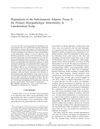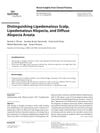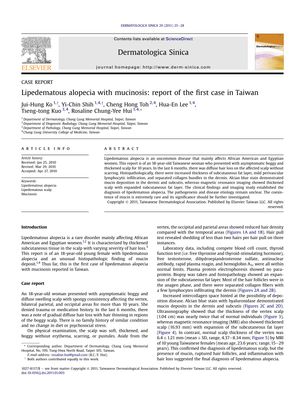TLDR Taiwan reported its first case of a rare scalp condition with no clear cause or treatment.
The document describes the first reported case of lipedematous alopecia with mucinosis in Taiwan, involving an 18-year-old woman who had a 10-year history of a boggy and thickened scalp, along with recent diffuse hair loss. Histopathological examination showed an increased subcutaneous fat layer, mild lymphocytic infiltration, and mucin deposition, which was confirmed by Alcian blue stain. MRI results supported the diagnosis by revealing an expanded subcutaneous fat layer. The rarity of mucin coexistence in this condition and the lack of clear etiology, pathogenesis, and effective treatment were noted, underscoring the need for better awareness and understanding of this condition.
30 citations
,
May 2008 in “International Journal of Dermatology” Lipedematous alopecia causes permanent hair loss due to increased scalp fat.
 28 citations
,
January 2007 in “Journal of dermatology”
28 citations
,
January 2007 in “Journal of dermatology” Three white adults had a rare scalp condition with increased fat and sometimes hair loss, suggesting it's not limited to black women and might be more widespread.
35 citations
,
January 2006 in “Dermatology Online Journal” Lipedematous scalp may be underdiagnosed and doesn't improve with finasteride.
 32 citations
,
June 2003 in “The American Journal of Dermatopathology”
32 citations
,
June 2003 in “The American Journal of Dermatopathology” Lipedematous scalp is mainly caused by an increase in fat tissue under the skin and is different from lipedematous alopecia.
 5 citations
,
January 2019 in “Skin appendage disorders”
5 citations
,
January 2019 in “Skin appendage disorders” The conclusion is that it's important to tell apart alopecia areata from lipedematous alopecia for proper treatment, as alopecia areata can be reversed.
 8 citations
,
October 2022 in “Regenerative Therapy”
8 citations
,
October 2022 in “Regenerative Therapy” New regenerative treatments for hair loss show promise but need more research for confirmation.
 July 2016 in “American Journal of Dermatopathology”
July 2016 in “American Journal of Dermatopathology” The meeting showcased rare skin disease cases, highlighting the need for accurate diagnosis and treatment.
 1 citations
,
October 2013 in “Expert Review of Dermatology”
1 citations
,
October 2013 in “Expert Review of Dermatology” Diagnosing alopecia areata is challenging and requires careful examination and various tests to distinguish it from other hair loss types.
 2 citations
,
January 2019 in “Case Reports in Dermatology”
2 citations
,
January 2019 in “Case Reports in Dermatology” A 66-year-old woman's thick scalp and hair loss were confirmed as lipedematous alopecia, a rare condition possibly influenced by genetics, with no effective treatment known.







